Managing common symptoms
Managing exhaustion/tiredness
Illness often changes your breathing patterns, requires you to use more energy, deconditions your muscles and increases stress. As a result, people recovering from COVID-19 often report feelings of exhaustion or tiredness and your normal daily activities can become hard.
You may find you feel weak and tired after small amounts of physical activity, or you can’t process information or concentrate as efficiently as usual. You may feel frustrated and anxious.5
To manage these symptoms, follow the three Ps to make the most of your body’s available energy –
pace, plan, prioritise.
6
The three Ps
Pace
Don’t push yourself to exhaustion. Instead, pace yourself. Save your energy by breaking up your daily activities into smaller, more manageable tasks. Rest often.
Plan
Plan your week in advance. Spread activities that need more energy (eg gardening, food shopping, laundry) across the whole week, with plenty of rest planned in between. If you can, ask family members or friends to help you. Consider energy-saving options like grocery-delivery services.
Prioritise
Only do essential tasks and activities. Either remove unnecessary tasks from your weekly plan or consider asking a family member or friend to do them for you.
|
You should also:
- avoid lifting or moving items that may place strain on your body; if possible, push items instead of lifting them
- remember to breathe – don’t hold your breath when completing tasks and activities
- try to get enough sleep every night, maintain a healthy diet and stay well hydrated.
If completing standard daily tasks and activities becomes unmanageable, contact your GP.
Managing a cough and/or breathlessness
COVID-19 mainly affects your lungs, which means you may have a persistent cough and might have trouble catching your breath during your recovery from the virus.
Your GP may recommend certain breathing exercises and positions that will help clear your chest and improve breathlessness. They may also suggest medication, depending on what’s best for you and your recovery.
If you’re suffering from a persistent cough, ask your GP for advice. You can get temporary relief by:7
- staying well hydrated
- if you need to cough but don’t have a drink nearby, try swallowing repeatedly instead, which copies the act of sipping water
- trying steam inhalation to help clear mucus/phlegm
- pour hot water into a bowl, and then hover your head over the bowl
- you can cover your head and the bowl with a towel to increase the effects
- sipping warm fluids to help soothe a sore throat
- making sure the rooms you spend most of your time in have good air circulation – you can improve air circulation by opening a window or door.
You can manage breathlessness by:
- speaking to your GP about breathing exercises
- remaining calm – stress and anxiety can increase your heart rate, which only increases your breathing rate and breathlessness
- trying the following resting positions to steady your breathing:5
|
Sit with a relaxed posture
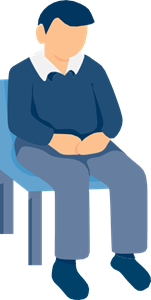 |
Stand up and lean backwards so your back rests on a sturdy surface
 |
|
Sit while resting your head forwards on a sturdy surface (eg a table) or resting your arms on your thighs to stop yourself from folding all the way forward
|
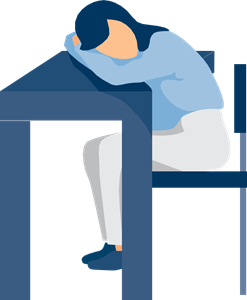 |
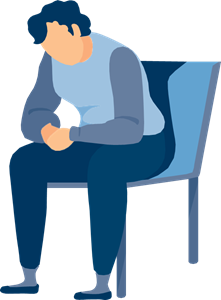 |
|
Lie down with pillows propping up your head so you’re not lying flat
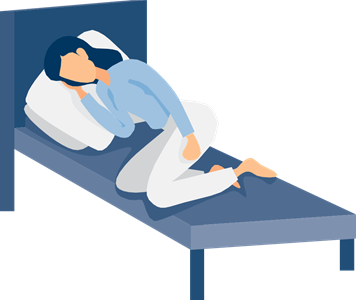 |
Stand up and lean forward slightly, resting your arms on a sturdy surface
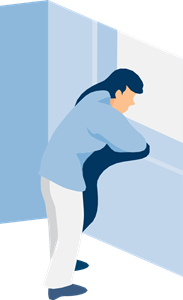 |
Maintaining your mental health and wellbeing
The emotional impact of COVID-19 can have a significant impact on your mental health. Many people experience low moods, anxiety, and/or difficulty sleeping.8
To manage your mental health and wellbeing:
- maintain a healthy, balanced diet and stay well hydrated, which helps your body fight illness and recover sooner
- limit your exposure to news and information about COVID-19 – excessive exposure can often make you feel anxious9
- reach out to family and friends – maintaining social connections is important and helps you feel supported and cared for
- focus on self-care – schedule time to do things you find enjoyable and relaxing. Practise mindfulness techniques, such as breathing exercises and meditation.
It’s vital that you speak to your GP or usual care provider if your situation worsens, or if you have any concerns. They are there to support your physical and mental health.
Easing muscle and joint pain
Moving regularly helps keep your muscles and joints in good condition. If you’re recovering from COVID-19, you probably haven’t been as active as you would be when in good health. This lack of activity can lead to muscle and joint pain.10
Your GP or allied health professional can suggest exercises that improve muscle strength and, ultimately, your ability to move painlessly.
Returning to exercise and activity
Talk to your GP or allied health professional about when to start exercise and what will work best for you in your recovery.
Introduce exercise into your weekly plans slowly and carefully. Follow the 3 Ps discussed earlier.
It is important to stop any exercise or activity and seek medical help if you experience worsening shortness of breath, difficulty breathing, or chest pain at any time.
Maintaining a healthy diet
You may lose your appetite, and your senses of taste and smell might be weakened. However, you need to maintain good nutrition and hydration during your recovery from COVID-19.
Even if you don’t feel hungry or thirsty, it’s important to continue to eat and drink regularly throughout the day. Your GP can give you essential diet advice and refer you to a dietician, if necessary.
Stopping smoking
COVID-19 and smoking can both cause significant harm to your immune system and lungs. Smoking while you recover from COVID-19 places extra strain on your body, increases your risk of infection and slows down your recovery.5,11
Quitting smoking has immediate and long-term benefits, including increasing your life expectancy.12 Talk to your GP about a quit plan and strategies for managing your smoking triggers and barriers to your success. It’s never too late to quit.
Accessing support services
You may need more short-term support while you recover. This could include help with food preparation and delivery, cleaning or assistance with activities of daily living.
Support can be arranged via your local council, state/territory health department, My Aged Care, Centrelink social work services, local charities and many community-specific organisations.
Let your GP know if you need extra help. They may be able to help link you with services.